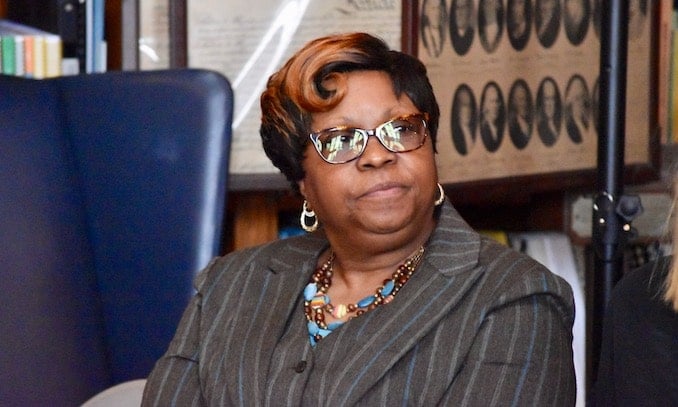Representative Williams’ bill would establish commission to study the decriminalization of prostitution
Representative Anastasia Williams (Democrat, District 9, Providence) has introduced legislation, H5354, to create a special legislative commission to study the health and safety impact of revising commercial sexual activity laws. “It’s important simply because when we talk about two consenting adults having a relationship, it could be a sexual relationship but in the eye of the law it’s prostitution. Who
February 12, 2019, 4:16 pm
By Steve Ahlquist
Representative Anastasia Williams (Democrat, District 9, Providence) has introduced legislation, H5354, to create a special legislative commission to study the health and safety impact of revising commercial sexual activity laws.
“It’s important simply because when we talk about two consenting adults having a relationship, it could be a sexual relationship but in the eye of the law it’s prostitution. Who gets penalized?” said Williams. “So therefore we need to sit down and talk about this. Get the meeting of the minds together and look at the reality of things as they are as opposed to how it’s been perceived to be. That’s one of the reasons that I’m interested in this commission being successful.”
The bill justifies the need for a commission to study the idea of decriminalizing sex work in Rhode Island with six points:
- There has been significant research on the safety and health impact of laws governing commercial sex, specifically related to violence, exploitation, stigma, and sexual health, but more needs to be done analyzing the data;
- Criminalization of prostitution disproportionately impacts women, transgender individuals, and people of color;
- There has been a documented increase in exploitation and violence against people in the sex industry in Rhode Island since the passage of federal legislation FOSTA/SESTA (see here and here);
- A newly published meta-analysis of 134 studies across many nations published over a 28 year period showed increased violence and incidence of STIs in jurisdictions with repressive police practices;
- A study conducted by Baylor University‘s Scott Cunningham and Manisha Shah of the University of California Los Angeles found that during 2003 through 2009, while indoor prostitution was still decriminalized in Rhode Island, the number of rapes diminished by 31 percent and the statewide incidence of gonorrhea among women diminished by 39 percent; and
- In New Zealand, where prostitution was decriminalized nationwide in 2003, a comprehensive study by researchers from the University of Otago’s School of Medicine found that more that 60 percent of the 772 sex workers who participated reported feeling more able to refuse to see certain clients, and 95 percent said they felt they had rights after decriminalization. Human trafficking has also diminished in New Zealand since decriminalization,
The commission is supported by COYOTE RI, ACLU of Rhode Island and the SOAR Institute.
“We join diverse and respected groups as the World Health Organization, United Nations AIDS, and Amnesty International, who all recommend decriminalization of sex work to reduce violence against sex workers,” writes COYOTE RI in a statement.
The statement continues:
“We additionally support this legislation as necessary against a backdrop of recent attacks on sex worker rights. For instance, legislators recently introduced S0096, also known as the Adult Entertainment Performance Tax Act on January 16, 2019. The bill imposes a tax for admission to adult entertainment businesses which will go to the Attorney General’s office to ‘combat human trafficking.’ This bill attacks sex worker establishments by forcing them to pay to combat sex trafficking, for which they are not culpable.
“We are also concerned by recent news stories detailing state repression of sex workers. Just last week, a Providence police lieutenant who was assigned to a strip club detail was placed on administrative leave after allegedly assaulting a sex worker he was romantically involved with. Additionally, two sex workers were arrested last week in a story involving a Boston police officer. The officer, who allegedly paid for sex, accused the women of stealing his gun (which was left unattended by him). We are alarmed that the women currently sit in jail while the officer is being rewarded with administrative leave with pay for his negligence in leaving a lethal weapon unattended.”
The Commission suggested by Williams’ bill would have 12 members:
- two of whom shall be members of the House, to be appointed by the Speaker of the House;
- four of whom shall be representatives of organizations serving populations disproportionately impacted by the criminalization of commercial sex, with priority given to organizations focused on improving public health, supporting survivors of violence and sexual assault, and civil rights organizations, including at least one from COYOTE-RI, and three from organizations selected by the Chairperson, and all of whom shall be appointed by the Chairperson;
- one of whom shall be the Director of the Rhode Island Department of Health, or designee;
- one of whom shall be an attorney from the Rhode Island Public Defender’s Office, to be appointed by the Speaker;
- one of whom shall be the Rhode Island Attorney General, or designee;
- two (2) of whom shall be individuals that have engaged in commercial sex, to be appointed by the Speaker of the House; and
- one of whom shall be the President of the Rhode Island Police Chief’s Association, or designee.
The commission will report its findings and results to the House of Representatives on or before February 7, 2020, and the commission will expire on May 7, 2020.
The bill is co-sponsored by Representatives Edith Ajello (Democrat, District 1, Providence), Camille Vella-Wilkinson (Democrat, District 21, Warwick), Joseph Almeida (Democrat, District 12, Providence), and Moira Walsh (Democrat, District 3, Providence).
UpriseRI is entirely supported by donations and advertising. Every little bit helps:
Become a Patron!
Was this article of value?
We are an reader-supported publication with no paywalls or fees to read our content. We rely instead on generous donations from readers like you. Please help support us.


